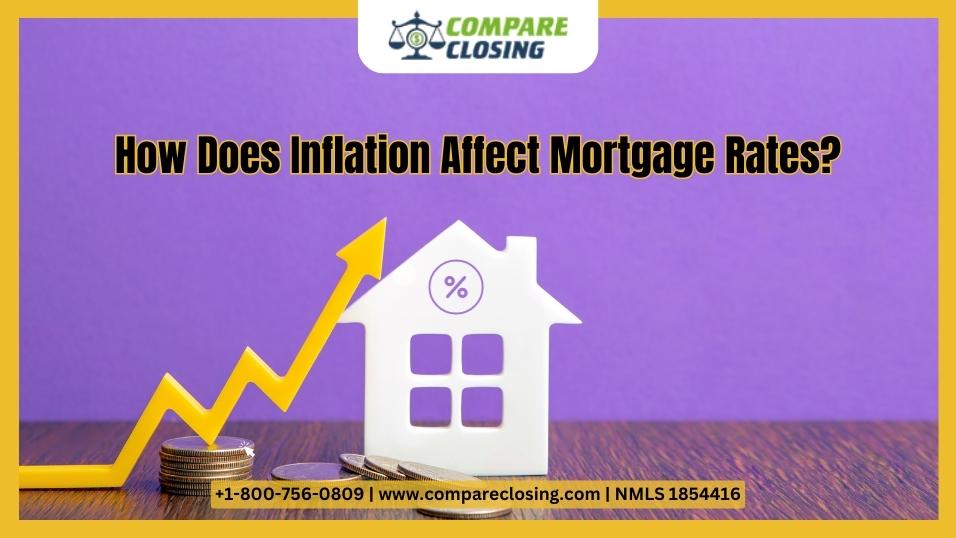Table of Contents
- What Are Netting Escrows & How Does It Work?: The Best Guide - January 2, 2024
- The Secret About Prescriptive Easement: Top Guide 1 Must Know - December 4, 2023
- About Home Equity Loans In Texas And How Can One Obtain It - November 27, 2023
How Does Inflation Affect Mortgage Rates?
Inflation is an economic phenomenon that affects various aspects of our lives, and one area that it can significantly impact is mortgage rates.
Understanding the relationship between inflation and mortgage rates is crucial for homeowners, prospective buyers, and investors alike.
In this unique guide, we will delve into the intricacies of this relationship, exploring how inflation influences mortgage rates and what it means for borrowers and the housing market as a whole.
Understanding Inflation
Before delving into the impact of inflation on mortgage rates, it’s essential to grasp the concept of inflation itself.
Inflation refers to the general increase in prices of goods and services over time, leading to the erosion of purchasing power.
When inflation rises, the value of each unit of currency decreases, and it takes more money to buy the same goods and services.
The Impact of Inflation on Mortgage Rates
Inflation has a direct effect on mortgage rates due to its impact on the broader economy. Here are some key ways in which inflation influences mortgage rates:
- Interest Rates and Monetary Policy: Inflation prompts central banks to adjust monetary policy to maintain price stability. Central banks often respond to rising inflation by increasing interest rates. When interest rates rise, borrowing becomes more expensive, including mortgages. As a result, lenders will charge higher interest rates to compensate for the increased cost of lending.
- Bond Yields: Mortgage rates are closely tied to long-term bond yields, particularly government bonds. Inflation erodes the purchasing power of fixed-income investments like bonds, as the interest they provide may no longer keep pace with rising prices. As a result, investors demand higher yields to compensate for inflation. Bond yield increases lead to higher mortgage rates.
- Market Expectations: Mortgage rates are influenced by market expectations of future inflation. Lenders and investors anticipate inflation when setting mortgage rates, as they seek to account for the expected loss in purchasing power over the loan’s term. If market participants anticipate higher inflation, mortgage rates will likely rise to offset the projected loss.
Implications for Borrowers and the Housing Market
The impact of inflation on mortgage rates has several implications for borrowers and the housing market:
- Affordability: Rising mortgage rates resulting from inflation can reduce the purchasing power of homebuyers. Higher interest rates increase monthly mortgage payments, making it more challenging for borrowers to qualify for loans and afford their desired homes. This, in turn, can dampen demand and slow down the housing market.
- Refinancing: Inflation-induced rising mortgage rates can discourage homeowners from refinancing their mortgages. Refinancing allows homeowners to take advantage of lower interest rates, reduce monthly payments, or shorten the loan term. With higher rates, the incentive to refinance diminishes, potentially limiting opportunities for homeowners to save on their mortgages.
- Housing Market Dynamics: Inflation-driven mortgage rate increases can impact the overall dynamics of the housing market. Slower demand due to reduced affordability may lead to a decrease in home prices or a slowdown in price growth. Additionally, if inflation leads to an overall economic slowdown, it may negatively affect job security and consumer confidence, further impacting the housing market.
Strategies for Borrowers and Investors
Given the potential impact of inflation on mortgage rates, borrowers and investors can consider the following strategies:
- Act Sooner: When inflation is expected to rise, borrowers and prospective buyers may consider acting sooner to secure a mortgage or make a purchase. By locking in a mortgage rate before they rise further, borrowers can ensure more favorable borrowing terms.
- Consider Adjustable-Rate Mortgages (ARMs): Adjustable-rate mortgages, or ARMs, often have lower initial interest rates compared to fixed-rate mortgages. While ARMs come with the risk of rates increasing over time, they can be a viable option if borrowers expect inflation and interest rates to remain relatively stable or decrease in the future.
- Diversify Investments: Investors should diversify their investment portfolios to mitigate the impact of inflation on fixed-income assets like bonds. Allocating a portion of the portfolio to assets that can benefit from inflation, such as real estate investment trusts (REITs) or inflation-protected securities, can provide a hedge against rising inflation and potentially offset the impact on mortgage rates.
Conclusion
Inflation plays a crucial role in determining mortgage rates, influencing borrowing costs and affordability for homeowners and prospective buyers.
As inflation rises, central banks respond by adjusting interest rates, which affects mortgage rates.
Understanding the relationship between inflation and mortgage rates empowers borrowers and investors to make informed decisions and adapt their strategies accordingly.
By monitoring market trends and considering the strategies outlined in this guide, individuals can navigate the impact of inflation on mortgage rates and optimize their financial outcomes in the housing market.
Amanda Byford
Amanda Byford has bought and sold many houses in the past fifteen years and is actively managing an income property portfolio consisting of multi-family properties. During the buying and selling of these properties, she has gone through several different mortgage loan transactions. This experience and knowledge have helped her develop an avenue to guide consumers to their best available option by comparing lenders through the Compare Closing business.






